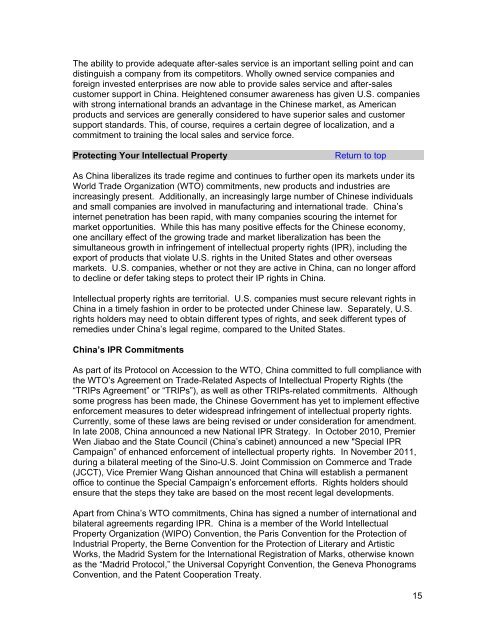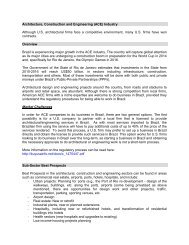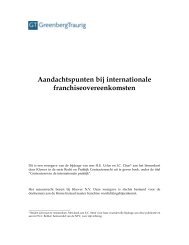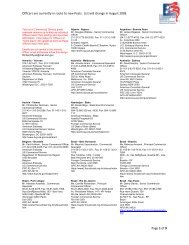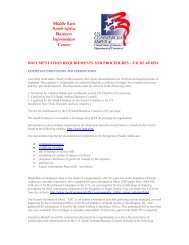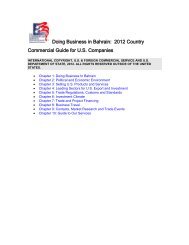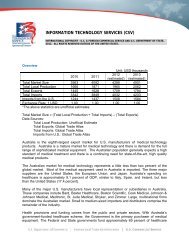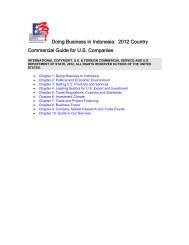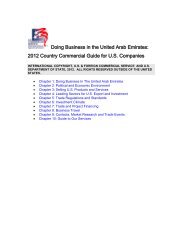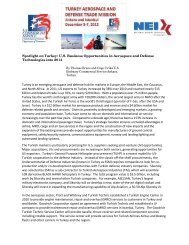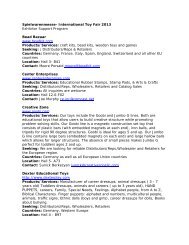Doing Business in China - Export.gov
Doing Business in China - Export.gov
Doing Business in China - Export.gov
You also want an ePaper? Increase the reach of your titles
YUMPU automatically turns print PDFs into web optimized ePapers that Google loves.
The ability to provide adequate after-sales service is an important sell<strong>in</strong>g po<strong>in</strong>t and can<br />
dist<strong>in</strong>guish a company from its competitors. Wholly owned service companies and<br />
foreign <strong>in</strong>vested enterprises are now able to provide sales service and after-sales<br />
customer support <strong>in</strong> Ch<strong>in</strong>a. Heightened consumer awareness has given U.S. companies<br />
with strong <strong>in</strong>ternational brands an advantage <strong>in</strong> the Ch<strong>in</strong>ese market, as American<br />
products and services are generally considered to have superior sales and customer<br />
support standards. This, of course, requires a certa<strong>in</strong> degree of localization, and a<br />
commitment to tra<strong>in</strong><strong>in</strong>g the local sales and service force.<br />
Protect<strong>in</strong>g Your Intellectual Property Return to top<br />
As Ch<strong>in</strong>a liberalizes its trade regime and cont<strong>in</strong>ues to further open its markets under its<br />
World Trade Organization (WTO) commitments, new products and <strong>in</strong>dustries are<br />
<strong>in</strong>creas<strong>in</strong>gly present. Additionally, an <strong>in</strong>creas<strong>in</strong>gly large number of Ch<strong>in</strong>ese <strong>in</strong>dividuals<br />
and small companies are <strong>in</strong>volved <strong>in</strong> manufactur<strong>in</strong>g and <strong>in</strong>ternational trade. Ch<strong>in</strong>a‘s<br />
<strong>in</strong>ternet penetration has been rapid, with many companies scour<strong>in</strong>g the <strong>in</strong>ternet for<br />
market opportunities. While this has many positive effects for the Ch<strong>in</strong>ese economy,<br />
one ancillary effect of the grow<strong>in</strong>g trade and market liberalization has been the<br />
simultaneous growth <strong>in</strong> <strong>in</strong>fr<strong>in</strong>gement of <strong>in</strong>tellectual property rights (IPR), <strong>in</strong>clud<strong>in</strong>g the<br />
export of products that violate U.S. rights <strong>in</strong> the United States and other overseas<br />
markets. U.S. companies, whether or not they are active <strong>in</strong> Ch<strong>in</strong>a, can no longer afford<br />
to decl<strong>in</strong>e or defer tak<strong>in</strong>g steps to protect their IP rights <strong>in</strong> Ch<strong>in</strong>a.<br />
Intellectual property rights are territorial. U.S. companies must secure relevant rights <strong>in</strong><br />
Ch<strong>in</strong>a <strong>in</strong> a timely fashion <strong>in</strong> order to be protected under Ch<strong>in</strong>ese law. Separately, U.S.<br />
rights holders may need to obta<strong>in</strong> different types of rights, and seek different types of<br />
remedies under Ch<strong>in</strong>a‘s legal regime, compared to the United States.<br />
Ch<strong>in</strong>a’s IPR Commitments<br />
As part of its Protocol on Accession to the WTO, Ch<strong>in</strong>a committed to full compliance with<br />
the WTO‘s Agreement on Trade-Related Aspects of Intellectual Property Rights (the<br />
―TRIPs Agreement‖ or ―TRIPs‖), as well as other TRIPs-related commitments. Although<br />
some progress has been made, the Ch<strong>in</strong>ese Government has yet to implement effective<br />
enforcement measures to deter widespread <strong>in</strong>fr<strong>in</strong>gement of <strong>in</strong>tellectual property rights.<br />
Currently, some of these laws are be<strong>in</strong>g revised or under consideration for amendment.<br />
In late 2008, Ch<strong>in</strong>a announced a new National IPR Strategy. In October 2010, Premier<br />
Wen Jiabao and the State Council (Ch<strong>in</strong>a‘s cab<strong>in</strong>et) announced a new "Special IPR<br />
Campaign‖ of enhanced enforcement of <strong>in</strong>tellectual property rights. In November 2011,<br />
dur<strong>in</strong>g a bilateral meet<strong>in</strong>g of the S<strong>in</strong>o-U.S. Jo<strong>in</strong>t Commission on Commerce and Trade<br />
(JCCT), Vice Premier Wang Qishan announced that Ch<strong>in</strong>a will establish a permanent<br />
office to cont<strong>in</strong>ue the Special Campaign‘s enforcement efforts. Rights holders should<br />
ensure that the steps they take are based on the most recent legal developments.<br />
Apart from Ch<strong>in</strong>a‘s WTO commitments, Ch<strong>in</strong>a has signed a number of <strong>in</strong>ternational and<br />
bilateral agreements regard<strong>in</strong>g IPR. Ch<strong>in</strong>a is a member of the World Intellectual<br />
Property Organization (WIPO) Convention, the Paris Convention for the Protection of<br />
Industrial Property, the Berne Convention for the Protection of Literary and Artistic<br />
Works, the Madrid System for the International Registration of Marks, otherwise known<br />
as the ―Madrid Protocol,‖ the Universal Copyright Convention, the Geneva Phonograms<br />
Convention, and the Patent Cooperation Treaty.<br />
15


